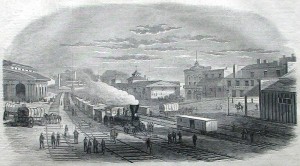The war is not the only destructive force that sometimes causes harm to churches of the Confederacy. Weather can also be problematic. Today a tornado damages the First Baptist Church of Shelbyville, Tennessee.
We are informed that Shelbyville was visited by another hurricane on last Saturday [7th] night, which blew down the Baptist Church, the Depot, Telegraph Office, besides other buildings. One person is said to have been killed. We have no other particulars.
Meanwhile, a news correspondent speaks glowingly of Atlanta’s First Baptist Church in a profile of the Georgia city.
I scarcely know how to commence a letter from this busiest of all busy cities of railroads, whence countless iron tracks branch from and connect with all parts of our glorious young Confederacy. . . The principal street (Whitehall) displays stores which vie with those of Charleston in their space and polite attendants, and in quiet times the market was as reasonable as attractive. Now, of course, there is but a scarcity of necessaries in the dry goods department, and the pretty refugees and fair Georgians shake their disconsolate heads, as with a peculiar smile the clerk whispers, “Quite out of all these, Madam.” . . . First impressions of Atlanta are not at all favorable; for, to a stranger, and especially a refugee, to whom congenial society is so acceptable, the bustle and whirl of business speak of naught but gold, gold, gold! . . . A favorite walk of the ladies is the sunrise promenade down to the Mineral Spring. The water is said to be very beneficial to those suffering from debility and dyspepsia. The component parts are magnesia, iron and soda. . . . Society in Atlanta is unique, but agreeable, made up of a sort of Mosaic of many shades of caste and kind. The refugees form a pleasant addition, and the Government officers stationed here furnish famous cavaliers for the winning belles. A few months ago and the pretty Puritans raised their white hands, and frowned from their pretty brows at the mere idea of dancing; indeed one of the fairest Georgians affirmed that she would not, at such a time, attend a soiree dansante; but the musical parties soon merged into “hops,” and gay quadrilles replaced the dignified “sonata,” or monopolizing “reverie.” Several very pleasant parties have awakened us from the long serious train of reflection which was beginning to pervade even the gayest; in fact, I cannot but think that these innocent reunions always serve to lighten and alleviate the gravity which the serious responsibilities of the present must tend to impress each heart with. Among the pleasantest of so many successful parties was one given at the “Anchorage,” as the bachelor home of the Navy Department is called. The rooms were very tastefully draped with flags, and Lieut. Robbins, of New Orleans, and John McPherson, of Charleston, played hosts to perfection. They certainly understood the art of entertaining, for each guest as they departed blessed the gay young bachelors who so delightfully entertained them. Our old friend Geo. McGinley, formerly so obliging in his department at the “Mills House” in Charleston, has entertained the Georgians with two very charming “hops” at the “Trout House.”–This is the best hotel for permanent boarders in Atlanta, has been lately renovated and repaired. It is well patronized, and none fail to like the polite and thoughtful host, so anxious for the comfort of his guests. The “Atlanta Hotel,” under the charge of Dr. Thompson, has an old reputation, and the constant stream of transient boarders writes a very satisfactory account for the wealthy proprietor The “Washington Hall,” is also a good hotel, near the “Car Shed,” where the table d’hote proves quite equal to the wants of the boarders. Near the “Washington Hall” we turn down Washington street, where the principle churches are situated. Decidedly the best filled pulpit in Atlanta is the Baptist, a very pretty church, under the pastoral charge of the Rev. Dr. Brantly, a son of the loved minister of the first Baptist Church in Charleston. All who listen to his terse and well written sermons come away well pleased, and weekly crowds attest his popularity, not only as a pastor, but as a friend. The Presbyterian has a fine organ, and is the prettiest church in Atlanta. The Episcopal has but a small congregation, and is decidedly the poorest church of that denomination that I have ever seen. Its only attraction here is that sublime ritual, which, when poorly read never fails in binding the heart and soul beneath that spell which the simple form and eloquent purity of the Church of England ever throws around its worshippers.–The Catholics have also a neat, tasteful little chapel, and near that is the pretty residence of Mr. George Gibbon, of Charleston….
Sources: “Tornado,” Fayetteville Observer, March 7, 1863 (link); “Atlanta Correspondence,” Charleston Courier, March 24, 1863 (link)



